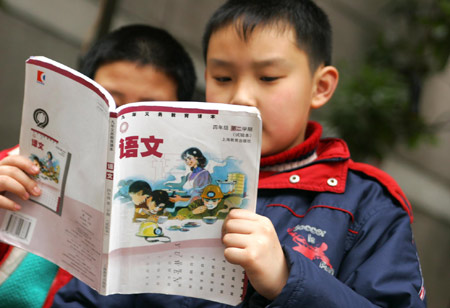Students want textual freedom
Long Teng, an 11-year-old junior high school student in Anhui Province, is interested in language studies. However, whenever he reads the prescribed language textbooks in school, he always gets bored.
 |
|
Two primary school students in Shanghai read a language textbook. |
"I lost enthusiasm after reading the textbooks. I only pay attention to the contents that may be useful in tests," the student told the Global Times.
Not only Long, many teachers and parents, too, complained that the current language texts tend to suppress students' thinking because there is only one answer to most questions. Some of these texts place too much stress on patriotism and political ideology, failing to motivate students because they found such content dull.
"Reading today's textbook is like drinking melamine-tainted milk," said Ye Kai, a Shanghai writer, in his blog.
Many students have abandoned reading contemporary textbooks at home and, instead have turned to a set of Chinese language textbooks published in 1932. The text, written by prominent educator Ye Shengtao (also called Yeh Sheng-tao) with illustrations by contemporary Chinese artist Feng Zikai, became a top seller soon after it was republished recently.
DangDang, a major online bookstore in China, has run out of stock of the text, for months now.
A Shanghai resident, Wu Zhiming, ordered a set of the textbooks for his nephew. "Only good books can shape great minds. There are many books in the market, but we lack classic reading material," Wu told the Global Times.
Uncreative content
Some buyers said the texts, with cartoons by Feng, are interesting, and reading matter in the book has a rhythm. "The articles are close to real life and full of true human feelings," said Ye Kai.
The phenomenon, some said, is a reminder that existing publishers should revise the textbooks to make them more appealing to students. Cai Zhaoyang, a Chinese teacher in Shaoxing, Zhejiang Province, told the Global Times Thursday that textbooks have long been used as a tool for "cultivating socialism's successors."
Cai said that unless publishers present the contents in the tone required to serve this purpose, they cannot get approval from education authorities. Many chapters in such textbooks are written in an authoritative style, full of patriotism and political ideology, failing to cultivate analytical and thinking skills.
For example, many lessons praise the soldiers who sacrificed themselves for the good of the country, and have standard, predictable answers to many questions.
Ye said in his blog that when his daughter was asked "Who is the cleverest figure during the Three Kingdoms Period?" and the only answer should be Zhuge Liang, even though Kong Ming (Zhuge Liang's other name) is also a correct answer.
Cai said some existing textbooks do not respect the interest of kids. "The classi-cal textbooks present a more authentic world for the kids to explore rather than feed them with uniformed answers."
 0
0 







Go to Forum >>0 Comments